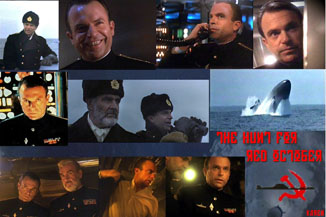Hindsight: March 1990
By Daron Aldridge
October 27, 2008
Number four is the forgettable Bad Influence, starring Rob Lowe as stalking sociopath and written by David Koepp, who was a long way away from Jurassic Park and Spider-Man. Despite being released on nearly 1,300 screens, this one eked out only $3.8 million ($6.4 million adjusted). It would soon fade out of the top ten and into oblivion. In contrast, the model of resilience for this year, Driving Miss Daisy fell to number five but still brought in $3.5 million ($5.9 million adjusted) after about three and half months in release.
Over March 16th to 18th, once again, a handful of weak openings failed to unseat The Hunt for Red October from number one. For its third weekend in release, Paramount added another 150 screens for a total of 1,817 screens. The additions likely helped the film only drop 21% to $11.1 million ($18.6 million adjusted). The unfortunate new releases also meant that enough people still wanted to see Josh Baskin battle a volcano for it to stay number two. Tom Hanks' Joe and Meg Ryan's three characters earned another $7 million ($11.7 million adjusted).
The new releases this weekend were led by the latest film adaptation of Sir William Golding's Lord of the Flies. Anarchy didn't exactly reign at the box office as a result. Lord of the Flies opened to $4.4 million ($7.4 million adjusted) on fewer than 1,000 screens for a decent $4,967 average. The Columbia release would have to settle for third place on the chart but a higher place in the hearts of all those high school English literature students who had found reading the Cliff's Notes version too taxing and wanted a quicker fix.
Even though Kid ‘N' Play's feature debut House Party fell 23% to $3.6 million ($6 million adjusted), that was good enough for fourth place.
Fifth place goes to another of the debuts, Blue Steel. If this had been the prequel to Zoolander as the title brings to mind, then it would have likely been a bigger earner. Alas, this was a Jamie Lee Curtis cop/action film that brought in a meager $2.9 million ($4.9 million adjusted) with a sad average of $2,214 per screen. In its second weekend, it would fall 43% and into obscurity.
Far outside the top five was the pair of competing dance films that would be punchlines for years to come -- Warner Bros' Lambada and Columbia's The Forbidden Dance. This dance battle took the occurrence of competing films with the same plot to a new realm by actually releasing them on the same date. Flashback even further to late 1987 and early 1988. The time between October 1987 and April 1988 saw three movies with nearly identical psyche-swatting plotlines in the form of Like Father Like Son with Dudley Moore and Kirk Cameron in October ($34.4 million total gross), Vice Versa with Judge Reinhold and Fred Savage in March ($13.7 million total gross), and 18 Again with George Burns and Charlie Schlatter in April ($2.6 million total gross). Since the first one out of the gate was the clear box office winner for this trio of films, it seemed that neither Warner Bros. nor Columbia wanted to relinquish the date to the other studio for the dancing films.
Unfortunately, the movie-going public could hardly have cared less. Lambada debuted in eighth place with $2 million ($3.4 million adjusted) and The Forbidden Dance, which incidentally was originally titled Lambada, The Forbidden Dance, was cold in 14th place with a pathetic $720,000 ($1.2 million adjusted). If only either movie was as entertaining as Tango de la Muerte film that inspired Lisa in the classic "Last Tap Dance in Springfield" from The Simpsons season 11.
The next weekend on March 23rd to 25th produced not only big increases for expected Oscar statue winners but also ushered in the romantic comedy era of Julia Roberts. Under the now defunct Touchstone Pictures banner, Disney released this R-rated heartwarming film embraced by teenage girls and young adults everywhere about a prostitute that finds true love while being paid $3,000 to keep him company. Please pardon a cynical rant but it is astonishing that so many people overlooked a particularly glaring character trait of questionable morality all because it was played by Julia Roberts and she gets a fairy tale ending. Regardless, this film secured Ms. Roberts' place in the box office royal court. Opening in the top spot, Pretty Woman scored $11.3 million ($19 million adjusted) and nearly out-grossed Roberts' only other film with her as a lead, 1988's Mystic Pizza, which had a total gross of $12.8 million. This Gere-Roberts tandem would end up with $178.4 million ($299.3 million adjusted) when it was all said and done after a long run with a spectacular final multiplier of 15.65.
Continued:
1
2
3




